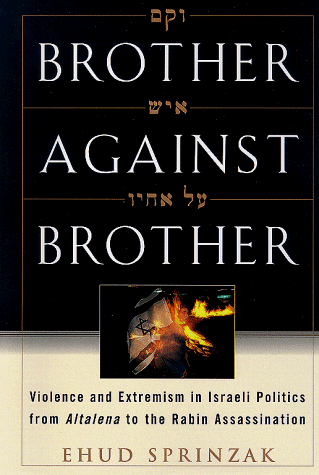Brother Against Brother: Violence and Extremism in Israeli Politics from Altalena to the Rabin Assassination
By (author): "Ehud Sprinzak"

ISBN0684853442
ISBN139780684853444
AsinBrother Against Brother: Violence and Extremism in Israeli Politics from Altalena to the Rabin Assassination
Original titleBrother Against Brother: Violence and Extremism in Israeli Politics from Altalena to the Rabin Assassination
Although we in America may think that our political disputes are fierce, the fact remains that when we use the phrase "the crossfire," we generally mean it to be taken metaphorically. Not so in Israel, where national politics is contentious and, as Ehud Sprinzak reveals in his groundbreaking new book, where vehemence often spills over into violence. Sprinzak, one of Israel's most prominent and respected political scientists, lays bare the historical roots of violence in Israeli domestic politics, examining the effects such militancy has had on the nation's civic culture. He traces the origins of this extremist thread to the era of the founding of the Jewish state, and shows how it has grown increasingly malignant in the past decade, culminating in the 1995 assassination of Prime Minister Yitzhak Rabin. "Brother Against Brother" takes the reader through the critical turning points of Israeli political history, and introduces us to the leaders whose careers were baptized by blood. In a masterful blending of narrative and historical analysis, Sprinzak begins with the "Altalena" incident of June 1948, the first armed dispute between David Ben-Gurion's Labor-led government and the right-wing paramilitary Irgun organization, led by future prime minister Menachem Begin. He then follows the legacy of conflict into the confrontations of the 1950s and the assassination of Dr. Rudolph Kastner, a World War II leader of the Hungarian Jews. Sprinzak shows how the 1967 Six-Day War -- Israel's greatest victory ever -- reopened, paradoxically, the great rift between the left and the right over the borders of Israel, inspiring such agitators as Meir Kahane, who founded the Jewish Defense Leaguein the United States and the Kach party in Israel, and the Orthodox rabbis of Gush Emunim. Finally, Sprinzak reveals how the militancy of Israel's religious right has grown more fierce since the signing of the Oslo accords, reaching its peak in the 1994 Hebron massacre and the Rabin assassination the following year.In spite of its somber subject, "Brother Against Brother" is not a pessimistic book. Sprinzak does not think that there is danger of domestic civil war in Israel, and is convinced that the traumatic assassination of Yitzhak Rabin has had a restraining influence on most Israelis, including the radical right. In addition to focusing on the roots of Israeli violence, he identifies the powerful psycho-political mechanisms of Israeli restraint. Sprinzak believes, in fact, that Israelis are not violent people, and that had other Western nations faced Israel's external and internal challenges, their streets would have been flooded with blood. The book's underlying assumption (and hope) is that when peace between Israelis and Arabs is reached and the great debate over the borders of the nation is finally laid to rest, Israeli political violence will decline dramatically. "Brother Against Brother" offers a historical perspective that is too often lacking in day-to-day political analysis, and opens a new chapter in our understanding of one of the world's most fascinating nations.